
Photo: Richard Hubert Smith
At the centre of Mike Bartlett’s King Charles III, is the glitter of Richard II‘s ‘hollow crown’, Shakespeare’s wrenching metaphor of the chasm between humanity and royalty. Unfortunately, this gem is so smothered by a lousy snarl of sub-Spitting Image caricatures and two-dimensional tabloid modernity that although it aims strongly, Bartlett’s precocious concept never lands its punches.
In a not-too-distant future, where the adored Queen Elizabeth II has just popped her clogs after a record-breaking seventy year reign, the vaguely bumbling, well-meaning Prince Charles finally finds himself thrust into the role he had almost given up on– ruler of the British Empire. But for the principled and opinionated Prince, the revelation that his power is mostly ceremonial in relation to a contentious bill of Parliament throws him into a quandary of conscience, and politicians and plebeians alike revolt around him, pining for the days of a more benign Royal authority.
Tom Scutt’s set design gives a succinct visual to this predicament. A crimson-carpeted podium, surrounded by towering, windowless cathedral walls– or palace walls– is the imposing mountaintop on which the reigning monarch finds himself, at once a prison and a pedestal. The activities of the soon-to-be King are underscored by Belinda Sykes and Paul Aditti’s solemn soundtrack, which begins as a funereal chorus for the late Queen and hauntingly underscores the elongated death-throes of Charles’ reign.
These promising simmering of personal conflict and public revolution are quickly thwarted, however, as soon as Bartlett’s poorly drawn cast of characters open their mouths. The majority of the Royals– those we think we know so well– are given no convincing opportunity to flesh themselves out beyond the personalities bestowed on them by the most inarticulate of tabloids. Harry (Richard Glaves), the dim party Prince; Wills, steered into the camera by the media-savvy Kate (Jennifer Bryden); the firebrand Labour prime-minister Mr Evans (Tim Treloar) and his double-talking Conservative counterpart, Mr Stevens (Giles Taylor). Camilla (Penelope Beaumont)”” ostensibly the most important woman in Charles’ life”” barely appears, aside to whimper occasional platitudes about strength in adversity. Even Princess Diana makes brief appearance, as a limping, simpering ghost.
The less said about that the better.
Not helping matters, Bartlett has decided to pen his script in a kind of jarring pseudo-Shakespearean lyricism, so characters find themselves soliloquising to the audience or pronouncing the occasional iambic pentameter. Which would all be quite a clever way to emphasise the long line of tradition the modern day royals have descended from, and their ill fit for modern society , if it weren’t for the fact that all the characters”” royal, politician, pleb”” speak this way and even then, only occasionally.
This stick figure characterisation transforms the initial roiling atmosphere of revolution into a damp squib in the second act, as events unfold from Charles’ first ill-advised decision to wield his kingly power, to the intervention of his oldest son– of course, the next-in-line and the rioting public’s favoured Prince.
Robert Powell makes a strong attempt to heave Bartlett’s ineffectual Charles into three-dimensions and mostly succeeds”” the would-be king’s private anguish playing languid and vivid over his craggy features. Of all of the actors however, Ben Righton’s William of Cambridge is most able to handle Bartlett’s baffling prose with sensitivity and naturalism, making William’s battle between personal and princely duty far more compelling than that of his father.
Frustratingly, King Charles III has the potential to be a fascinating investigation of the function of the British royals in the 21st century, and the almost impossible tension between personal conscience and public duty. But the play suffers so hugely from the paper-thin personalities of its characters and the painting-by-numbers plot that the danger and sadness of this clash never makes an emotional impact.

